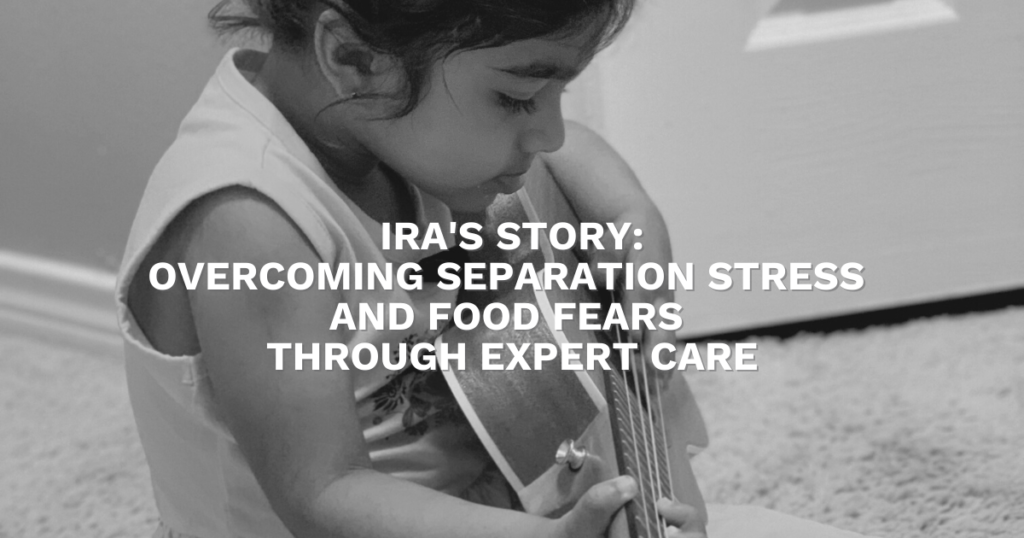
The Pain of Separation

At nearly two years old, Ira suffered from extreme separation anxiety as well as extreme feeding difficulties. She could not cope with any type of separation from her mother and could not tolerate any type of textured food. Worried about Ira’s growth and development, her parents turned to the only people they knew could help. Ira’s parents sought help from the experts at The Warren Center.
Although she was 22 months old during the initial consultation, Ira could only eat purees in exchange for a reward of watching her iPad screen. Though she would eat a few bites of puree, Ira still preferred breastmilk instead of solid food. Ira frequently gagged in her attempts to eat textured food and ultimately refused to swallow non-textured food. Ira’s mother, Madhu Selvaraj, found it difficult to work from home due to Ira’s inconsolable crying for breastmilk and inability to self-soothe or entertain herself. As both parents are from India but remain in the U.S. on work visas, it was crucial that they perform well on their jobs.
As distressing as these signs appeared, these symptoms only worsened at the idea of separation from her mother. Ira would vomit up her breakfast during the car ride to daycare and refused food while at daycare – even though daycare lasted 7-8 hours. She would cry without stopping for more than 30 minutes at a time. Since separation during drop-offs were more difficult with the mother, Ira’s parents attempted to compromise by having the father take Ira to daycare. However, he would often have to pick Ira up again soon after due to vomiting and the daycare’s adherence to health code policy. Unable to handle the crying and vomiting, the daycare facility caregivers informed her parents that they could no longer accommodate Ira and asked them to leave the daycare.
The Promising Improvements
Upon referral to The Warren Center, Ira immediately began specialized skills training (SST) with Dalia Ruiz , an early intervention specialist (EIS). In addition to the SST to cope with separation anxiety, Ira began receiving speech therapy and feeding therapy services with speech-language pathologist Karen Lin. Within two months of SST, Ira showed vast improvement in social and coping skills. Her anxiety at her new daycare decreased to the point at which she no longer needed SST.
Ira’s participation in speech therapy and feeding services continued for the following year. Initially, Ira had a vocabulary of around 20-30 words and used limited two-word phrases. However, with the help of The Warren Center, Ira now uses five-word phrases and sentences, and her vocabulary has expanded to hundreds of words.
Since starting feeding therapy, Ira has stopped breastfeeding altogether and no longer needs the iPad as an incentive to eat solid food. She began to experiment with healthy crackers and cookies, eventually demonstrating willingness to try the daycare’s food. Upon completing therapy, Ira now eats rice, meatballs, crepes, blueberries, and a host of other foods of varying textures and consistencies. She no longer vomits up food out of anxiety, and she has even begun to make friends at her daycare center.
The Power of a Triumphant Return
Ira’s condition has improved so significantly that she was even able to visit India for one month and then return to her local daycare with little regression in behavior or separation anxiety. Although she sometimes does not want to leave her parents to attend daycare, she no longer cries at the facility and no longer vomits due to anxiety. Instead, she enjoys playing and interacting with her friends.
Even with the switch to Teletherapy during the COVID-19 shelter-in-place orders, Ira continued to show improvement in tolerating various food textures and consistencies. Her parents incorporated advice from their Teletherapy sessions into their daily routine and saw vast improvements in Ira. Her parents are thrilled with Ira’s growth and developmental milestones, and they no longer worry about her receiving adequate nutrition.
Although Ira’s condition was a challenging case of extreme separation anxiety, feeding sensitivity, and language delay, this successful conclusion shows that no challenge is too great when a comprehensive plan tailored specifically to a family’s needs is in place. Ira’s parents are grateful that their daughter has made remarkable progress.


